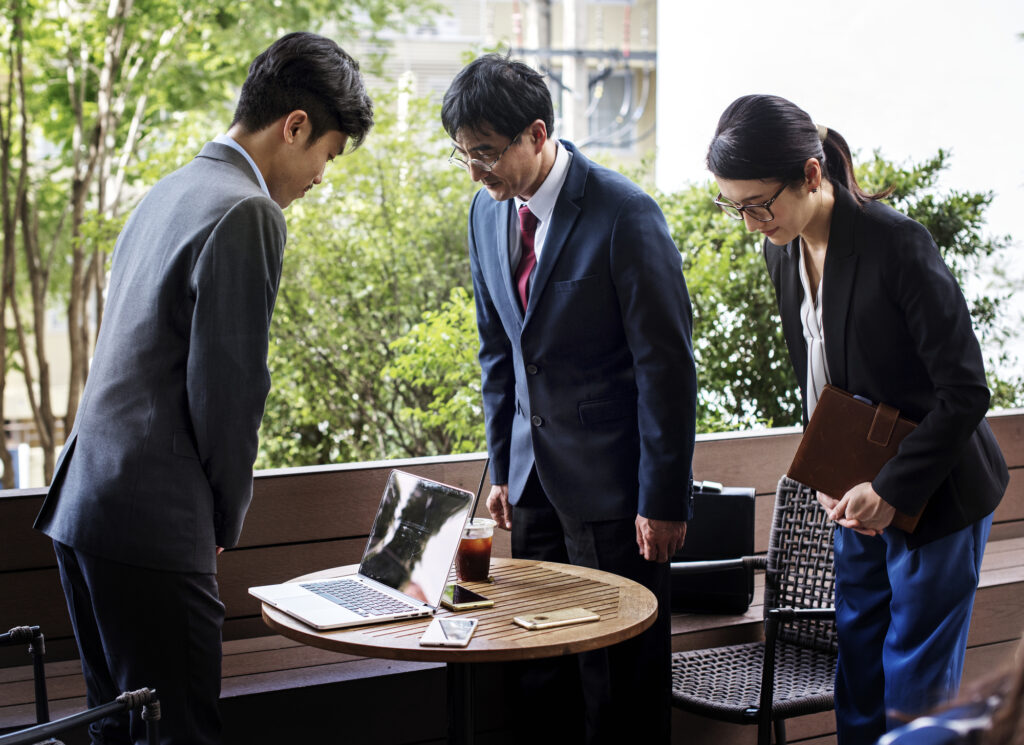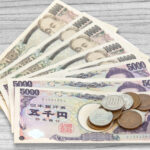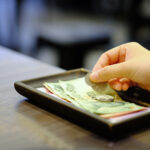Etiquette is serious business in Japan, and it’s present in nearly all aspects of life. From removing your shoes in certain settings to sitting properly, the Japanese practice several manners and customs in their everyday life. There’s even a proper way to approach something as simple as exchanging business cards.
Swapping business cards—or meishi as they’re called in Japan—is a much more important practice than it is in the West. Following rules of etiquette is essential if you want to make a good impression. Whether you’re moving to Japan or just in the country on business, this is one area of etiquette that you’ll need to learn (and follow) with precision.
Read on to learn how to mind your manners when exchanging business cards in Japan, so you always come off as respectful to those you’re doing business with.

Why are business cards so important in Japan?
Business cards are one of the most important aspects of business culture in Japan. Every exchange of business cards serves as a lasting first impression, so it’s important to both have professional-looking cards and present them the right way. Even in an increasingly digital world, business cards remain important.
The roots of business card culture in Japan are deeply intertwined with the respect and integrity that follows career culture. People in Japan don’t just have jobs: they have livelihoods that they’re proud of, and their business card reflects that sentiment. They’ve worked hard to earn their title, and they’re prepared to show others that they’re capable of living up to that title and the expectations attached to it. Thus, handing over a business card can be seen as a promise: “this is who I am and what I can do for you.”
On the flip side, accepting a business card from someone is a reciprocation of that pride and respect. When you accept a card and handle it with care, you’re telling the other person that you acknowledge their professionalism and respect their career. Taking a moment to look at the card and safely stow it in a safe place is the equivalent of saying, “thank you, I will keep you in mind as someone who can help me.”
Whether you’re an employee, a freelancer or a business-owner, business cards serve as a mini-introduction to you. They’re the key to networking in Japan, laying a foundation for good business relationships, so you need to have a high-quality card on hand anywhere you go.
The business card exchange process
In Japan, respect and etiquette mean a lot, and you need to follow the right steps for a successful business card exchange. Every Japanese person understands this process, so you need to follow it to the letter to leave a positive impression.
If you’re attending a business meeting, have your cards ready (bring enough for everyone in attendance) and garner the respect of your new colleagues by:
- Bow and present your card. The first step in a successful business card exchange requires you to bow slightly and introduce yourself while you present your card. Always hold the card in your right hand, by the top corner, so the recipient can see the name and logo as you offer it to them. Use the traditional phrase, “Hajima-mashite,” or “Nice to meet you,” as a greeting.
- Accept the other person’s card. When the other person offers their card, accept it with both hands. Hold the card at a position below your chest, and make sure you thank them. Make sure to handle the card with care—remember, it’s a sign that you respect the person and the information they’ve given you. Be careful not to crush or bend the card.
- Review the business card. Take a close look at the business card and make sure you understand the information it contains, especially the presenter’s name. Don’t hesitate to practice saying the name—it’s not rude to ask for help if you need some clarification on pronunciation.
- Put the card away respectfully. After exchanging cards and greetings with your colleagues, always carefully place each card away in a card case. It’s best to keep the cards in order, arranging the cards you receive accordingly so that you can keep track of how to address each person according to their rank.
What NOT to do when exchanging business cards
You should follow the steps detailed above exactly to adhere to proper Japanese business card etiquette. You’re trying to make a great first impression on a business associate, after all, and there’s little room for error. Presentation is a major part of the exchange—not simply handing your card to someone and accepting theirs.
That said, there are some common mistakes you should avoid during a business card exchange:
- Never write on a business card you just received—all the information the presenter wants you to have should already be on the card. Annotating the card or marking it in any way is considered very rude. Remember, a business card is a representation of professional stature and integrity.
- Never place business cards into a wallet or pocket—come prepared with a card case. You’ll make a positive impression on the other person when you carefully slide their card into a leather business card case or other well-maintained card holder.
- Never forget to thank each person for their business card, and always make sure you follow bowing rules of etiquette to show respect to others according to their rank. For example, if you’re speaking with a more senior business executive or someone in an advanced position, your bow should be lower than theirs.
When in doubt, always treat a business card you’ve just received as a precious gift. By showing the business card respect and honor, you pass that respect and honor to the person who gave it to you.
Tips for exchanging business cards
Want to make the best first impression on your colleagues and business associates? Whether you’re in the country on business or working hard to build your network as an expat, business cards are your gateway to the professional community. Keep these tips in mind during your time in Japan:
- Bring plenty of business cards everywhere you go. You never know when or where you may meet a new face. If you’re attending a business meeting or event, bring enough cards (and then some) for the number of attendees you think you’ll meet. Note that it’s not uncommon to hand out more than a hundred business cards at a major networking event or expo!
- If you’re visiting Japan on business, you need to come prepared with double-sided business cards. Information in Japanese should be on one side, while the corresponding information should be in English on the other. This shows potential partners or business colleagues that you’re respectful of and serious about their culture. It also establishes trust, maximizing your opportunities for fruitful business results.
- Even if you aren’t fluent in Japanese, be sure to examine the Japanese-language side of a business card. Take note of the title of each person you meet. Often, you’ll encounter two people in the same division with the same title. By looking closely at the kanji, you can determine who is senior—there may be additional subtitles or words on the Japanese side of the card that better-indicate ranking.
- Make sure every business card you present is clean and neat. Business cards with dog-eared corners or smudges are frowned upon. Make your best first impression with a fresh, clean card. In this same vein, you might consider having business cards printed on heavier paper stock, to both reinforce their integrity and show the quality of your business cards to others receiving them.
- You always need to have a business card on hand. Appearing at a meeting without one does irreparable damage to a business relationship—it’s almost like refusing to shake hands in Western society. Keep plenty of cards on hand, all the time.
- If you want to be truly polite and make the best possible impression, invest in a leather or other high-quality professional business card case. It shows the utmost seriousness for formal etiquette.
In the digital age, you might be wondering, “what about digital business cards?” There are all types of tap-to-share business cards out there, and Japan is a technology-forward society. That said, you’ll want to avoid trying to share digital business cards. The physical business card is supreme and, again, represents a physical manifestation of someone’s proud career. Recognize it not necessarily as a sharing of information, but as a sharing of stature.
Bring business cards with you everywhere in Japan
There are many longstanding yet unwritten rules when it comes to business card etiquette in Japan. By following all the formalities down to the letter, you can make a great first impression on any colleague or business associate you meet in Japan. Be sure to have plenty of cards handy wherever you go—you never know who you’ll meet, as well as when and where you’ll meet them.
- How Much Money Can You Make Teaching English in Japan? - December 12, 2022
- The Best Places to Teach English in Japan - December 9, 2022
- The Best Credentials for Teaching English in Japan - December 8, 2022








